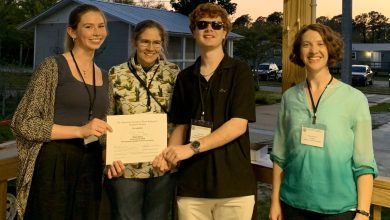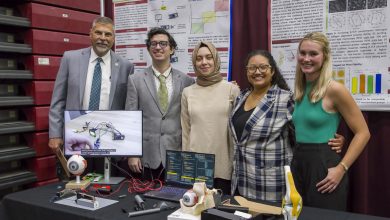The (Not So) Awkward Computer Programmer
When you attend a school founded for the engineers of NASA, add brilliant minds and complicated algorithms and lines of computer code that make the average computer user’s head spin (myself included).
With every major, there is a stereotype. Computer programmers tend to be known as the not-so-socially adapt ones. The most important thing about this is it’s just a stereotype. Many students here don’t fit into that stereotype, thanks to all of the opportunities on our campus.
A recent study has actually shown that staring at a computer screen for extended periods of time may actually influence our ability to effectively socially interact with others. Our extensive interactions with screens may actually inhibit our ability to read the facial expressions and non-verbal communication of those around us.

The study conducted by Uhls, et al (2014) looked at a group of preteens and their ability to recognize non-verbal emotional cues. The study conducted had an experiment as well as a control group. Both groups participated in a pre- and post-experiment test to measure their ability to recognize facial cues. The difference between the groups was that the preteens in the experiment were sent to a nature camp for five days where all electronics were banned. Instead they participated in traditional camp activities such as hiking, archery and fishing. The control group on the other hand were left to participate in their day-to-day activities and continue to use electronics as they usually would (about 4 hours a school day).
What were the results, you ask? Well after the five-day sleep-away camp, both groups were retested on their ability to recognize facial emotion cues, and it turns out the individuals who spent their time at the camp had scores that improved drastically more than the control group for both facial expressions and videotaped scenes.
The implications of the study are that short-term exposure to more social interactions combined with time spent away from electronic devices and communication improves preteens’ understanding of nonverbal communication.
What does this have to do with a college? We aren’t preteens, after all. But the implications of the study are quite simple; short term exposure to periods with no electronics is beneficial to our capacity to interact with others.
Whether we are preteens or adults, this is still an important factor in our day-to-day lives. Being able to read each other’s non-verbal cues is extremely important and beneficial to everyone.
So computer programmers, engineers and psychologists alike, take a step away from those computer screens, put away those cell phones and mp3 players, and go outside and spend time with your friends. Participate in club activities, go do something that our bodies were made to enjoy. Go out and live under the blue screen of the Florida blue skies.






